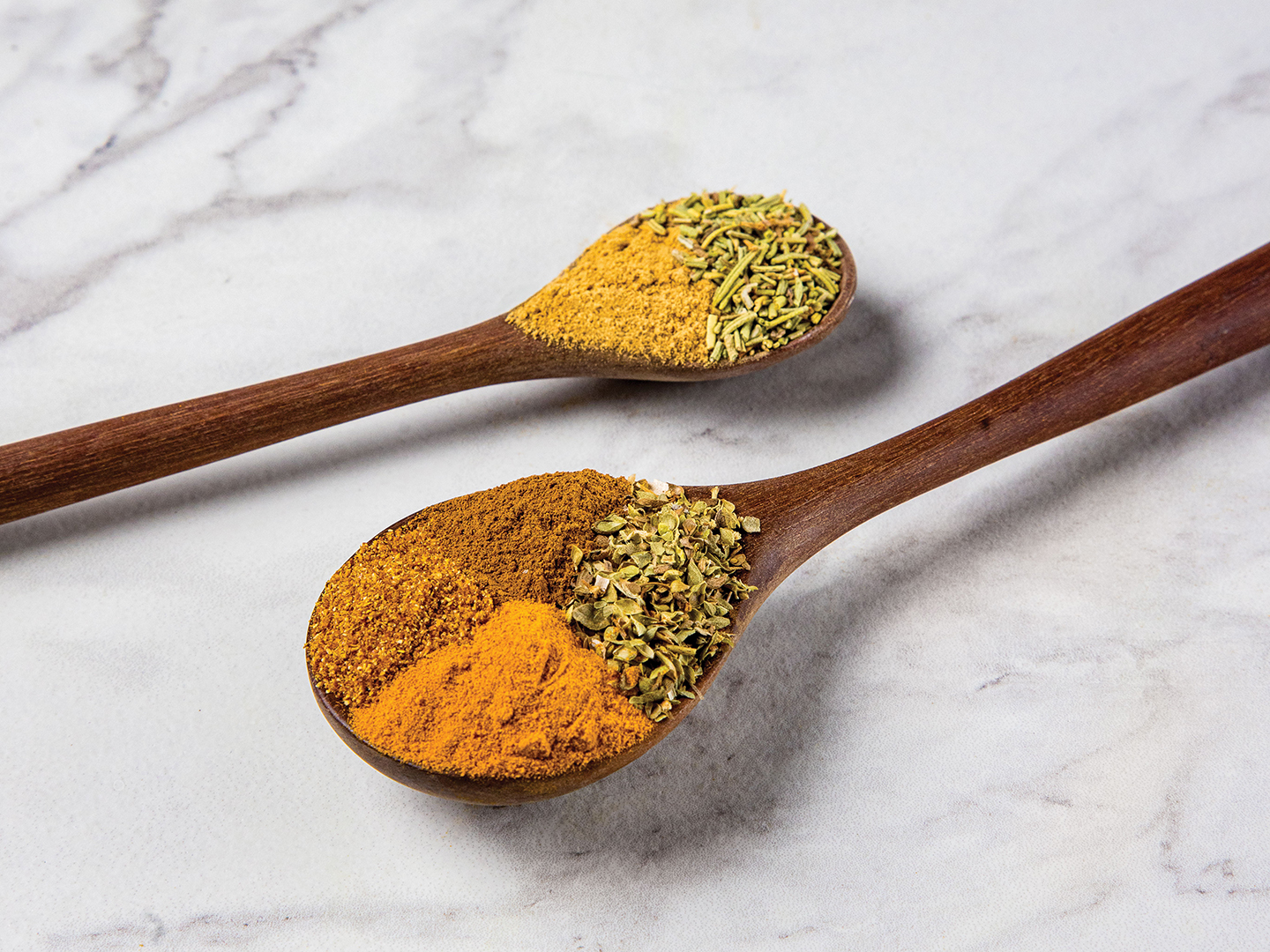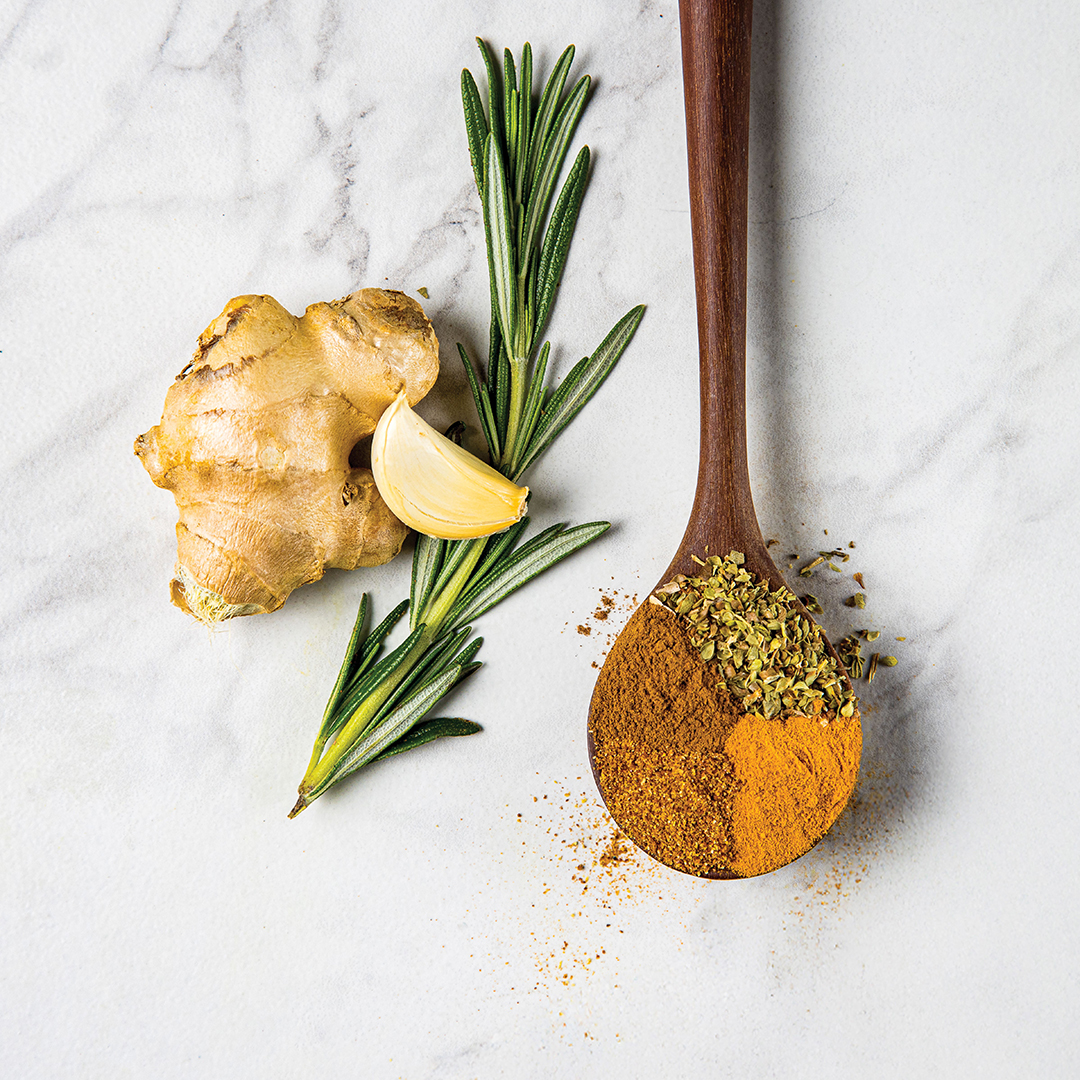
Photos: Chris Emeott
Kowalski’s Markets nutritionist explores the benefits of staple spices.
As the new Year rolls in, it’s the perfect time to spice up your health routine. Not only do some beloved spices add vibrant flavors, but they also offer a variety of potential health benefits. From fighting inflammation to aiding digestion, these pantry staples are said to be both flavorful and functional. Sue Moores, R.D., a nutritionist at Kowalski’s Markets, shares ways to add more of these spices into your meals—making it simple to embrace a tastier start to the year.
“We all hope for success,” Moores says about setting realistic goals. “There’s definitely a set of ingredients that will hopefully increase your chances of success.”
Cayenne: This fiery spice is often found in wellness drinks—and for good reason. “It’s amazing and, curiously to me, helpful for digestion,” Moores says. Cayenne works to increase stomach acid, which amplifies the digestion process. She notes that those with GERD, heartburn or other reflux conditions should steer clear of cayenne.
Cinnamon: Achieving benefits might be relatively easy with this warming spice. “A lot of the research has been around inflammation, and it’s quite positive with lowering blood sugar levels and total cholesterol,” Moores says. Reap its benefits by incorporating anywhere from 1/2 to 1 tsp. of cinnamon per day.
Garlic: This fan-favorite is said to pack a powerful anti-viral punch. “The component in it is allicin, which is also found in onions,” Moores says. Allicin has been shown to have antiviral properties—so if you feel a cold coming on, Moores recommends incorporating garlic into your meals. She notes that, for those with GERD or IBS, garlic can be difficult to digest.
Ginger: “It’s a go-to for a lot of people for nausea and digestion,” Moores says. “Curiously, it’s mixed results … Ginger, in its pristine state or used as an ingredient, has some benefits to nausea and digestion.” To see full benefits, including anti-inflammation properties, Moores recommends incorporating ginger (into tea, for example) for multiple days in a row.

Oregano: Although less likely to have a high-powered impact, oregano shows a potential effect on digestion and circulation. “It’s a lovely flavor in food, but it would take a lot to get it to be a health win,” Moores says.
Rosemary: This winter treasure is said to boast anti-inflammatory, memory and cognitive benefits. “It also has anti-anxiety properties, which I love,” Moores says. It contains compounds that supposedly improve memory and cognitive function—and rosemary might also improve skin, hair and more.
Turmeric: “It’s really an element within turmeric, and that is curcumin,” Moores says. The curcumin found in this colorful spice has been shown to be anti-inflammatory and boost antioxidant properties. “If you pair it with black pepper, you can increase the absorption as much as 2,000 percent,” she says.
Moores notes that all benefits should be taken with a grain of salt—although multiple studies have been conducted, benefits have been shown to vary. “There’s a resource if you want to get serious,” she says. She recommends ConsumerLab. “It’s like the Consumer Reports for supplement versions of spices,” she says. “They tell you which brands are manufactured to conserve the phytonutrients and the components in it.”
For adding spices for flavor or impact, Moores has a few tips. “Most spices should be used early in the cooking process, so flavors can be released over time,” Moores says, noting one exception to the rule: Fresh garlic should be added toward the end. Moreover, spices add multiple layers of vibrant flavors, which Moores says is a great tool for helping to reduce the sodium content of foods. “That a huge health benefit,” she says.
Embrace the aforementioned spices with two fitting recipes for soup season.
This information is for general purposes only and is not intended as medical advice. Consult your primary physician or another qualified healthcare provider before incorporating new spices, herbs or other dietary changes into your routine, especially if you have preexisting health conditions or are taking medication.
Kowalski’s Markets
8505 Valley Creek Road; 651.578.8800
Facebook: Kowalski’s Markets
Instagram: @kowalskis_markets
Pinterest: Kowalski’s Markets
X: @kowalskismarket






















